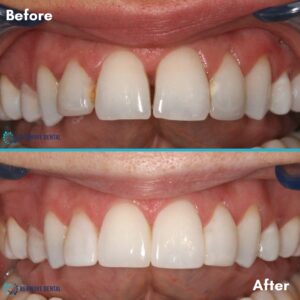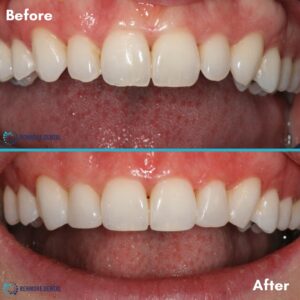Composite bonding (also known as dental bonding) has become a highly sought after dental treatment in recent years, as an effective way to improve the aesthetic appearance of your teeth without damaging the tooth structure.
But what exactly is composite bonding? In this guide, we aim to answer some commonly asked questions our patients have when discussing composite or edge bonding treatments.
What exactly is composite bonding?
This minimally invasive, cosmetic procedure involves the addition of composite resin material to the tooth surface. This treatment can be used in many ways, such as:
- To reshape uneven teeth.
- To elongate shorter teeth.
- To close small spaces between teeth.
- To improve the cosmetic appearance of discoloured or misshapen teeth.
- To restore/repair teeth with gaps, chips or fractures.

As the composite material is added directly to your teeth, in most cases there is usually no need to drill or remove any of the original tooth structure- making it a minimally invasive procedure.
What is the difference between composite bonding and edge bonding?
While both treatments use the same material, composite bonding generally covers most of the tooth structure, while edge bonding is only applied to the tooth edges to repair minor chips and gaps.

How do I know if I am suitable for composite bonding?
If you are considering composite bonding, it is essential that you have a full consultation prior to any treatment. As bonding treatment is specific to each patient, the dentist will discuss exactly what your desired treatment outcome is during your consultation and form a comprehensive treatment plan that works best for you and your smile.
It is important to note that not all spaces/uneven surfaces can be closed or reshaped with bonding; in some cases, orthodontics may be required to close larger spaces prior to dental bonding.
Will composite bonding whiten my teeth?
Composite bonding will be colour-matched to the exact shade of your existing teeth to ensure they blend together seamlessly. Therefore, if you are considering dental bonding and are not currently happy with the shade of your existing teeth, a full course of our teeth whitening treatment is usually recommended before going ahead with any dental bonding, as the dental bonding must be matched to the new, whiter shade of your teeth after whitening is complete.
It is important to note that bonding material will not whiten, so if teeth whitening is required as part of your treatment plan it must be completed before any composite bonding can go ahead. If you are unsure which option is best for you, the dentist will go through both teeth whitening and dental bonding options with you at your comprehensive consultation.
How long does dental bonding last?
With proper care and oral hygiene maintenance, dental bonding should last a patient years, however this can depend on a number of factors. Composite resin is a strong material, but it is not as durable as longer-term solutions, such as a porcelain veneer or crown for example.
While porcelain crowns/veneers can last upwards of 15+ years, dental bonding is expected to last about 5+ years; after that it usually needs to be repaired, polished to remove staining, or replaced at an additional cost- so while it can be an ideal solution in some cases, bear in mind it is not a permanent treatment and will need to be updated in future.
What is the difference between composite bonding and porcelain veneers/crowns?
Composite bonding is a layer of composite resin material added to the surface of the tooth, whereas a veneer/crown involves a porcelain layer being custom-made in a dental laboratory and added to the tooth. Treatment such as veneers or crowns involve much more preparation of the tooth surface than composite bonding, which usually doesn’t involve any drilling of the tooth structure.
Composite bonding is also more affordable than these options. It is important to note that these treatments are not interchangeable; sometimes in the cases of severe staining, chipping/uneven tooth surface, composite bonding may not be sufficient, and a more durable solution such as a crown may be advised instead. If you are unsure which treatment option may be best for you, it is always recommended to book a dedicated consultation with one of our dentists to discuss treatment options.
How do I organise an appointment for composite bonding?
As mentioned, it is essential that you have a full consultation prior to any treatment so that the dentist can form a comprehensive treatment plan that works best for you and your smile.
To organise a composite bonding consultation, contact our patient care team on 091 757 678 or email info@renmoredental.ie for more information. More information on the different treatments we offer can be found in our treatment section.
